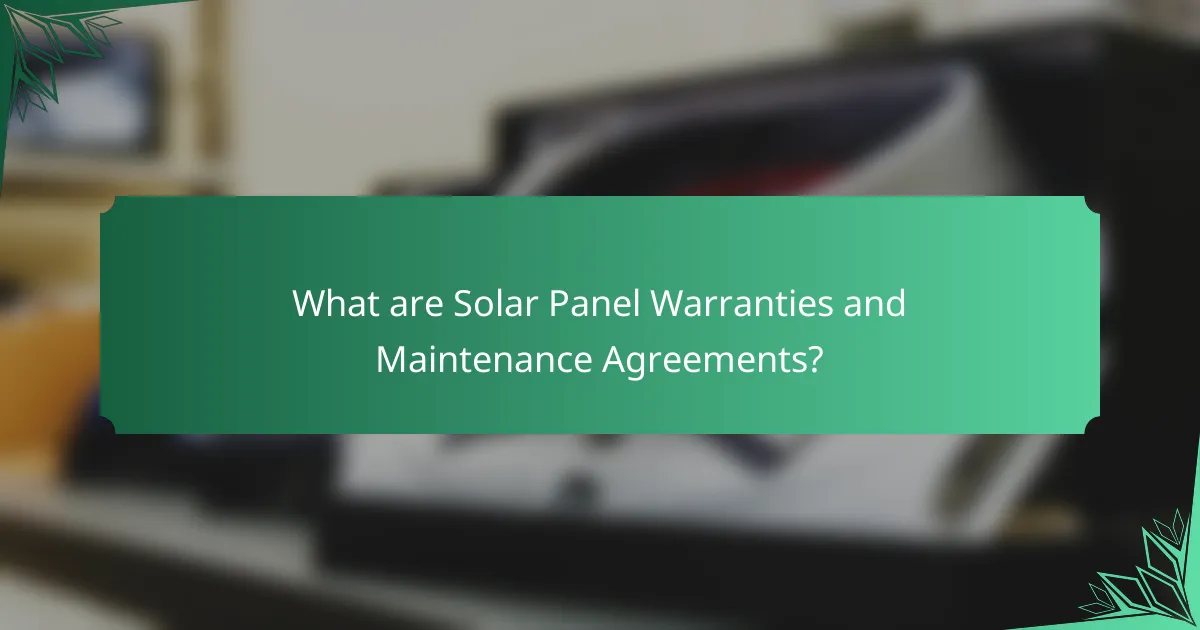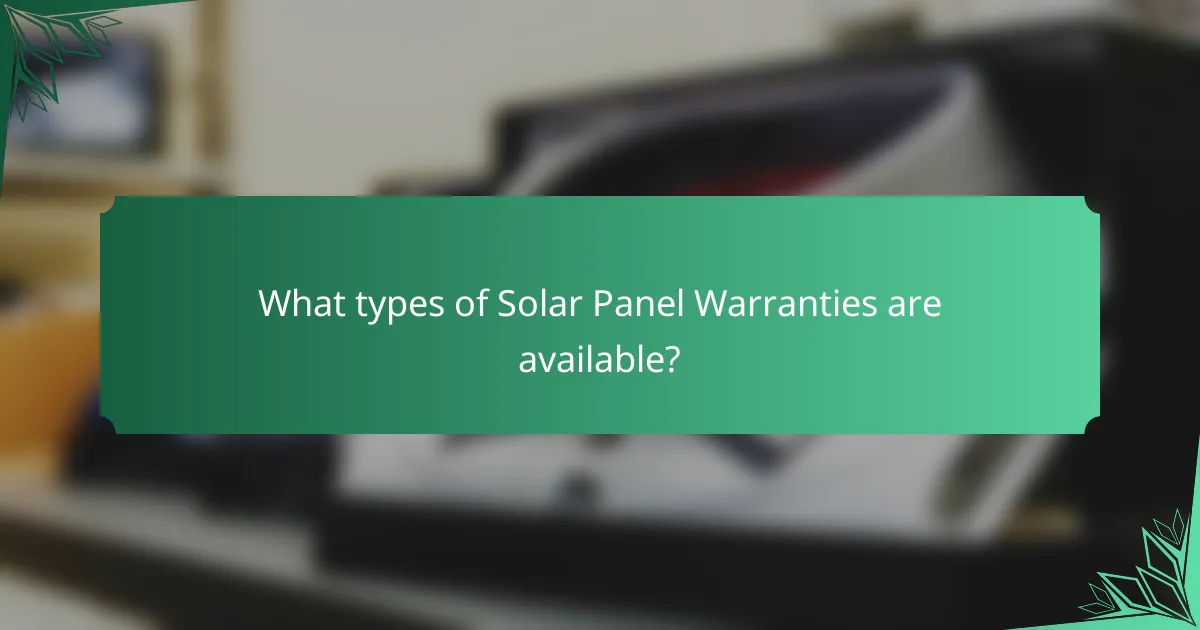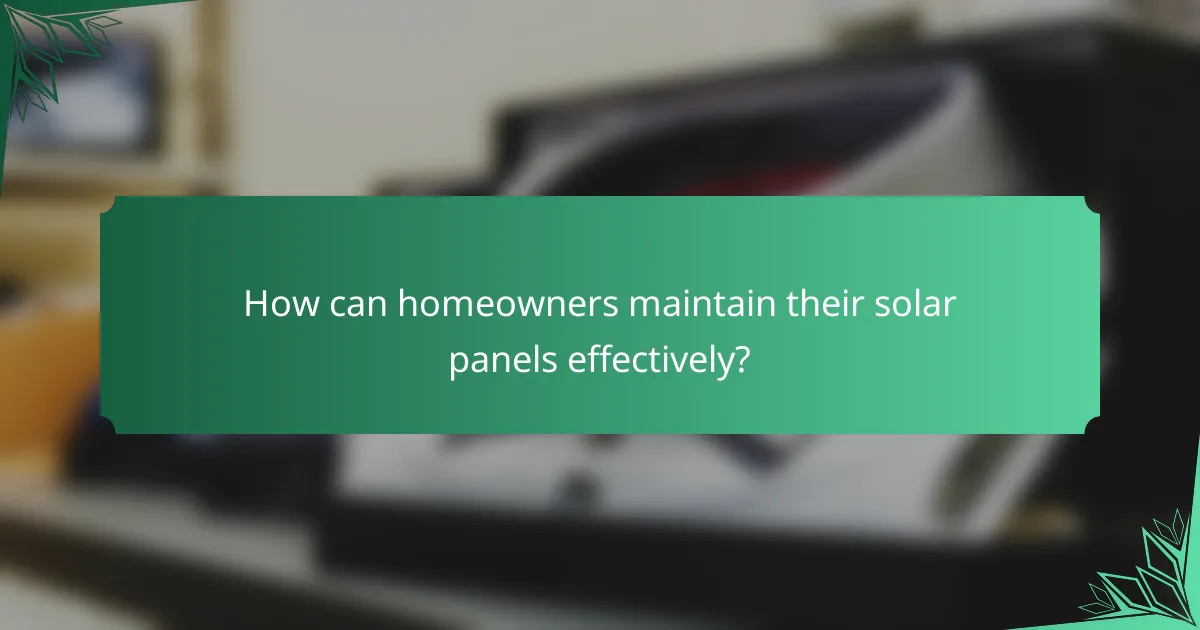
What are Solar Panel Warranties and Maintenance Agreements?
Solar panel warranties are guarantees provided by manufacturers regarding the performance and durability of solar panels. They typically cover defects in materials and workmanship for a specific period, often ranging from 10 to 25 years. Maintenance agreements are contracts that outline the services provided to maintain solar panel systems. These services may include regular inspections, cleaning, and repairs to ensure optimal performance. Both warranties and maintenance agreements protect the investment in solar energy systems. They help ensure that panels operate efficiently over their lifespan. According to the Solar Energy Industries Association, warranties are crucial for consumer confidence in solar investments.
How do Solar Panel Warranties differ from Maintenance Agreements?
Solar panel warranties and maintenance agreements serve different purposes. Warranties typically cover defects in materials and workmanship for a specified period. They ensure that the solar panels function as intended, often lasting 10 to 25 years. Maintenance agreements, on the other hand, involve regular inspections and servicing of the solar system. These agreements help maintain optimal performance and can include cleaning and repairs. Warranties protect against manufacturing issues, while maintenance agreements focus on upkeep and performance over time.
What key aspects are covered in Solar Panel Warranties?
Solar panel warranties typically cover performance, workmanship, and product defects. Performance warranties guarantee a specific energy output over a defined period, often 25 years. Workmanship warranties protect against installation errors, usually lasting 1 to 10 years. Product warranties address defects in materials or manufacturing, often spanning 10 to 25 years. Some warranties also include coverage for labor costs associated with repairs. Additionally, warranties may outline the conditions under which they remain valid, such as proper maintenance. These aspects ensure consumers are protected against potential issues with their solar systems.
What services are typically included in Maintenance Agreements?
Maintenance agreements for solar panels typically include regular inspections, cleaning services, and performance monitoring. Regular inspections help identify potential issues before they escalate. Cleaning services ensure that solar panels operate at maximum efficiency by removing dirt and debris. Performance monitoring involves tracking energy output to detect any drops in performance. Additionally, some agreements may cover repairs and replacement of damaged components. These services contribute to the longevity and efficiency of solar panel systems.
Why are Solar Panel Warranties important for homeowners?
Solar panel warranties are crucial for homeowners because they provide protection against defects and performance issues. These warranties typically cover the panels for 25 years, ensuring long-term reliability. Homeowners can avoid costly repairs if the system underperforms or fails. Additionally, these warranties can enhance the resale value of the property. According to the National Renewable Energy Laboratory, a robust warranty can increase buyer confidence. This assurance encourages homeowners to invest in solar energy systems. Overall, warranties safeguard the investment and promote peace of mind.
How do warranties protect the investment in solar panels?
Warranties protect the investment in solar panels by guaranteeing performance and covering repair costs. They typically include a performance warranty that ensures the panels will produce a specified amount of electricity over a given period. This warranty often lasts 25 years, providing long-term assurance to the owner. In addition, manufacturers usually offer a product warranty that covers defects in materials and workmanship. This warranty can range from 10 to 25 years.
If the solar panels fail to meet performance standards or develop defects, the warranty allows for repairs, replacements, or refunds. For example, if a panel produces less than 80% of its rated capacity within the warranty period, the manufacturer is obligated to compensate the owner. This financial protection helps mitigate the risk associated with the initial investment in solar technology. Overall, warranties provide peace of mind and safeguard against unexpected costs related to solar panel maintenance and performance issues.
What risks do warranties mitigate for solar panel owners?
Warranties mitigate several risks for solar panel owners. They primarily cover defects in materials and workmanship. This protection ensures that if panels fail to operate as intended, the manufacturer will repair or replace them. Warranties also address performance issues. If solar panels do not meet specified energy output, the warranty may provide compensation or replacement. Additionally, warranties can protect against environmental damage. They may cover issues arising from hail, wind, or other weather-related impacts. This coverage helps owners avoid significant repair costs. Overall, warranties provide peace of mind by reducing financial risks associated with solar panel ownership.

What types of Solar Panel Warranties are available?
There are three main types of solar panel warranties available: product warranties, performance warranties, and labor warranties.
Product warranties cover defects in materials and workmanship. They typically last between 10 to 25 years, depending on the manufacturer. Performance warranties guarantee a certain level of energy production over time. These often extend to 25 years and ensure panels produce at least 80% of their rated capacity. Labor warranties cover installation services and may last from one to ten years.
These warranties are important for protecting consumers from defects and ensuring long-term performance. They provide peace of mind regarding the investment in solar energy systems.
What is the difference between product and performance warranties?
Product warranties cover defects in materials and workmanship of a product. They ensure that the product will function as intended for a specified period. For solar panels, this typically means that if a panel fails due to manufacturing issues, it will be repaired or replaced. Performance warranties, on the other hand, guarantee the energy production levels of the solar panels over time. These warranties ensure that the panels will produce a certain percentage of their rated output for a specified duration. For instance, a performance warranty may state that the panels will produce at least 80% of their rated capacity after 25 years. Thus, the key difference lies in the focus; product warranties address physical defects, while performance warranties address energy output and efficiency.
What does a product warranty cover specifically?
A product warranty specifically covers defects in materials and workmanship. This means that if the product fails due to manufacturing issues, the warranty will typically provide repair or replacement. Warranties may also cover certain types of wear and tear, depending on the terms. Additionally, warranties often include a specified duration during which claims can be made. For instance, many solar panel warranties last 25 years for performance and 10 years for product defects. It is important to read the warranty document for specific exclusions and limitations.
How does a performance warranty ensure energy output?
A performance warranty ensures energy output by guaranteeing a minimum level of energy production over a specified period. This warranty typically covers a duration of 25 years. It provides assurance that the solar panels will generate a certain percentage of their rated capacity. For example, many warranties promise 80% output after 25 years. If the panels underperform, the manufacturer may compensate the owner. This compensation could involve financial reimbursement or replacement panels. The warranty incentivizes manufacturers to produce high-quality, efficient products. It also protects consumers from potential losses due to underperformance. Thus, performance warranties play a crucial role in maintaining expected energy output levels.
What factors influence the length and terms of Solar Panel Warranties?
The length and terms of solar panel warranties are influenced by several key factors. Manufacturer reputation plays a significant role; established brands often provide longer warranties. The quality of materials used in panel construction also affects warranty duration. Higher-quality panels typically come with extended warranties. Installation practices impact warranty terms; professional installation can lead to better coverage. Local regulations and standards may dictate minimum warranty lengths. Warranty type, such as product versus performance warranties, influences coverage specifics. Finally, market competition can drive companies to offer more attractive warranty terms to consumers.
How does the manufacturer’s reputation impact warranty terms?
The manufacturer’s reputation significantly influences warranty terms. A strong reputation often leads to longer warranty periods. Manufacturers with a positive track record are perceived as more reliable. This perception encourages consumers to trust their products. As a result, these companies may offer more comprehensive coverage. In contrast, manufacturers with a poor reputation may provide limited warranty terms. This reflects their uncertainty about product longevity. Research shows that companies with higher customer satisfaction ratings tend to offer better warranties. Therefore, a manufacturer’s reputation is a key factor in determining warranty conditions.
What role does the installation quality play in warranty coverage?
Installation quality directly impacts warranty coverage for solar panels. High-quality installation ensures optimal performance and longevity of the solar system. Poor installation can lead to damages or malfunctions that are not covered under warranty. Many manufacturers specify that warranties are void if installation does not meet certain standards. This means that professional installation is crucial for maintaining warranty validity. For instance, improper sealing can cause moisture intrusion, leading to equipment failure. Additionally, some warranties require proof of professional installation to be honored. Therefore, ensuring quality during installation is essential for protecting warranty rights.

How can homeowners maintain their solar panels effectively?
Homeowners can maintain their solar panels effectively by regularly cleaning them and inspecting their condition. Cleaning solar panels removes dirt, dust, and debris that can reduce efficiency. It is recommended to clean them at least twice a year or more frequently in dusty areas. Homeowners should use a soft cloth or sponge with mild soap and water for cleaning.
Additionally, inspecting the panels for any physical damage is crucial. This includes checking for cracks, loose connections, or shading from nearby trees. Regular inspections help identify issues early, ensuring optimal performance. Homeowners should also monitor energy production through their inverter or monitoring system.
If energy output decreases significantly, it may indicate a maintenance need. Lastly, homeowners should schedule professional maintenance every few years to ensure comprehensive checks and repairs. Regular maintenance can enhance the lifespan and efficiency of solar panels.
What routine maintenance tasks should be performed on solar panels?
Routine maintenance tasks for solar panels include regular cleaning, inspection for damage, and monitoring performance. Cleaning solar panels helps remove dirt and debris that can reduce efficiency. It is recommended to clean panels at least twice a year, depending on local environmental conditions. Inspections should be performed to check for cracks, loose connections, or shading issues. Regular performance monitoring ensures the system operates at optimal efficiency. This can be done using monitoring systems that track energy output. Proper maintenance can extend the lifespan of solar panels and maximize energy production.
How often should solar panels be cleaned and inspected?
Solar panels should be cleaned at least twice a year. Regular inspections should occur annually. Cleaning removes dirt and debris that can reduce efficiency. Inspections help identify potential issues early. Factors like local weather and dust levels may affect frequency. In areas with heavy rainfall, cleaning may be less necessary. Conversely, dusty environments may require more frequent cleaning. Regular maintenance ensures optimal performance and longevity of the solar panels.
What signs indicate that solar panels need maintenance?
Signs that indicate solar panels need maintenance include decreased energy production, visible dirt or debris, and physical damage. A significant drop in energy output may suggest issues with the panels or inverter. Accumulated dirt or debris can block sunlight, reducing efficiency. Cracks, chips, or corrosion on the panels signal potential damage that requires attention. Additionally, unusual sounds from the inverter or electrical components may indicate malfunction. Regular inspections can help identify these signs early. According to the National Renewable Energy Laboratory, maintaining optimal performance is crucial for maximizing energy efficiency.
What are the best practices for managing Solar Panel Warranties?
The best practices for managing solar panel warranties include understanding the terms and conditions, keeping documentation organized, and performing regular maintenance. Review warranty details to know coverage duration and specific exclusions. Retain all purchase receipts and warranty documents for future reference. Schedule routine inspections to ensure optimal performance and identify issues early. Communicate promptly with the manufacturer or installer if problems arise. Document any maintenance or repairs performed to maintain warranty validity. Understanding these practices helps maximize warranty benefits and prolong solar panel lifespan.
How can homeowners keep track of warranty documentation?
Homeowners can keep track of warranty documentation by organizing all related documents in a dedicated folder. This folder should be easily accessible and labeled clearly. Digital copies of warranties can be scanned and stored on a computer or cloud service. Utilizing a spreadsheet can help track expiration dates and service requirements. Homeowners should also set reminders for important dates related to their warranties. Keeping receipts and installation documents together with warranties is essential. Regularly reviewing this documentation ensures homeowners remain informed about their coverage. Proper organization can prevent loss of important information and facilitate claims when necessary.
What steps should be taken when filing a warranty claim?
To file a warranty claim, first, gather all necessary documentation. This includes the original purchase receipt and warranty information. Next, review the warranty terms to ensure the issue is covered. Contact the manufacturer or retailer to report the problem. Provide them with the details of the issue and the supporting documents. Follow their instructions for submitting the claim. Keep records of all communications for future reference. According to industry standards, timely reporting of issues typically leads to quicker resolutions.
What common issues arise with Solar Panel Warranties and Maintenance Agreements?
Common issues with solar panel warranties and maintenance agreements include limited coverage, exclusions, and unclear terms. Many warranties may not cover certain types of damage, such as those caused by severe weather. Maintenance agreements can sometimes have hidden fees or require specific service providers. Customers often face challenges in claiming warranty repairs due to complicated processes. Additionally, the duration of warranties may not align with the expected lifespan of the panels. Misunderstandings about what constitutes normal wear and tear can lead to disputes. The lack of transparency in terms and conditions can also create confusion for consumers.
How can disputes over warranty claims be resolved?
Disputes over warranty claims can be resolved through several methods. First, parties should review the warranty terms to understand their rights and obligations. Next, direct communication between the involved parties can clarify misunderstandings. Mediation is another option, where a neutral third party helps facilitate a resolution. If mediation fails, arbitration may be pursued, where an arbitrator makes a binding decision. Legal action is the final resort if all other methods do not yield results. According to the American Arbitration Association, arbitration can be a quicker and less expensive alternative to litigation.
What are the most frequent reasons for warranty denials?
The most frequent reasons for warranty denials include lack of proper maintenance, unauthorized repairs, and installation errors. Warranty claims may be denied if the solar panels were not maintained according to the manufacturer’s guidelines. Unauthorized modifications or repairs can void the warranty, as manufacturers require adherence to specific procedures. Additionally, improper installation by non-certified professionals can lead to warranty issues. According to industry standards, these factors are commonly cited in warranty denial cases.
What tips can help homeowners maximize their Solar Panel Warranty and Maintenance Agreements?
Homeowners can maximize their solar panel warranty and maintenance agreements by understanding the terms and conditions thoroughly. Read the warranty documents carefully to know what is covered. Regular maintenance checks ensure that the system operates efficiently and any issues are addressed promptly. Document all maintenance activities and communications with service providers. This record can be crucial for warranty claims. Homeowners should register their solar panels with the manufacturer to ensure warranty validity. Additionally, keeping receipts for any repairs or services performed can support warranty claims. Staying informed about any changes in warranty policies is also beneficial. Regularly check the performance metrics of the solar system to identify potential problems early.
The main entity of this article is solar panel warranties and maintenance agreements, which are essential components for protecting investments in solar energy systems. The article provides a comprehensive overview of the types of warranties available, including product, performance, and labor warranties, while distinguishing them from maintenance agreements that ensure optimal performance through regular inspections and cleaning. Key aspects covered include warranty terms, the role of manufacturer reputation, and the importance of proper installation. Additionally, the article addresses common issues related to warranties and maintenance agreements, strategies for effective management, and tips for maximizing benefits, ultimately guiding homeowners in maintaining their solar panel systems effectively.